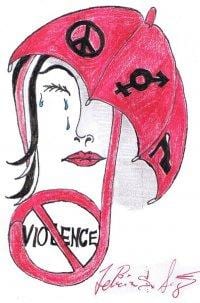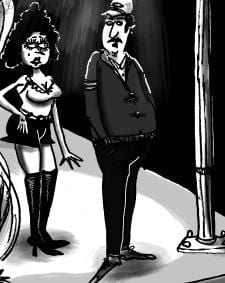
BAD TIMING. The BC Supreme Court's decision came two days before the International Day to End Violence Against Sex Workers. Events are planned across Canada for Dec 17, see the bottom of this story for details. Credit: courtesy of POWER
A group of Vancouver sex workers seeking to challenge the constitutionality of Canada’s sex-trade laws says it will continue its fight despite being handed a defeat in BC Supreme Court Dec 15.
It’s a fight for safety, human rights and equality before the law, says the Downtown Eastside Sex Workers United Against Violence Society (SWUAV), which brought the case forward.
Justice William Ehrcke ruled that the Downtown Eastside group will not be permitted to challenge the laws that criminalize them because its members are no longer themselves employed in the sex trade.
The decision (read the PDF here) — issued just two days before the Dec 17 International Day to End Violence Against Sex Workers — is being roundly condemned by sex-trade worker groups and human rights advocates.
Lawyer Katrina Pacey says the ruling highlights the court’s failure to understand the perils sex workers face.
“This case is about how the laws marginalize sex workers, and it is ironic the court won’t even let them through the door to make the argument,” Pacey says.
Joe Arvay worked with Pacey on the case.
“The government’s argument that the Court should recognize as plaintiffs only those sex workers who are presently active in sex work or who are presently facing an actual prosecution is neither sound law or good policy,” Arvay says.
Arvay famously spearheaded the Little Sister’s case against Canada Customs book seizures in the Supreme Court of Canada several years ago.
SWUAV’s Sheryl Kiselbach, a former sex worker with 30 years of experience in the sex industry, thinks the decision is “ridiculous.”
Ehrcke rejected the plaintiffs’ argument that the highly public nature of the court process effectively prohibits active sex workers from launching a challenge due to fears of arrest and retaliation, as well as social censure and discrimination against themselves and their families.
“It’s ridiculous that 30 years of experience in sex work, including criminal convictions, is not enough to give me the right to challenge the prostitution laws,” says Kiselbach. “I have the safety and support to do it now, but it would have been impossible for me while working in the trade.”
Vancouver sex-trade-worker advocate Jamie Lee Hamilton says the ruling allows the law to continue discriminating against women active in the sex trade.
“It sends a very poor message to women who are still on the street, if they are still on the street, if they are trying to escape … that they only deserve to be down on the Downtown Eastside where another Pickton can come and hunt them down.”
Lainie Basman of Montreal’s Coalition for the Rights of Sex Workers calls the decision “incredibly disappointing.”
“The BC Supreme Court had the rare opportunity to hear a critical claim by sex workers that Canada’s Criminal Code endangers their safety and violates their fundamental right to equality,” Basman says.
“Outrageously, the court has chosen to close its doors to one of this country’s most marginalized and oppressed groups.”
The Canadian HIV/AIDS Legal Network is condemning Ehrcke’s ruling as “small-minded.”
The decision restricts the courts as a venue for protecting human rights, the network says in a statement.
“The court had the opportunity to consider the substance of the human rights issues at stake for some of those who are most marginalized and vulnerable in Canadian society.
“Instead, the court accepted the federal government’s procedural argument that only individuals who are currently engaged in sex work or currently facing criminal charges should be able to raise these human rights issues,” the network says.
The plaintiffs and their lawyers will be reviewing the judgment and considering their next steps.
A similar case in Ontario is still making its way through the court system, and Ehrcke noted that in that case, one of the plaintiffs is currently a sex worker.
“It thus appears that she may have a more direct interest in the constitutional challenge than do the plaintiffs in the case at bar,” he wrote in his ruling.

 Why you can trust Xtra
Why you can trust Xtra


